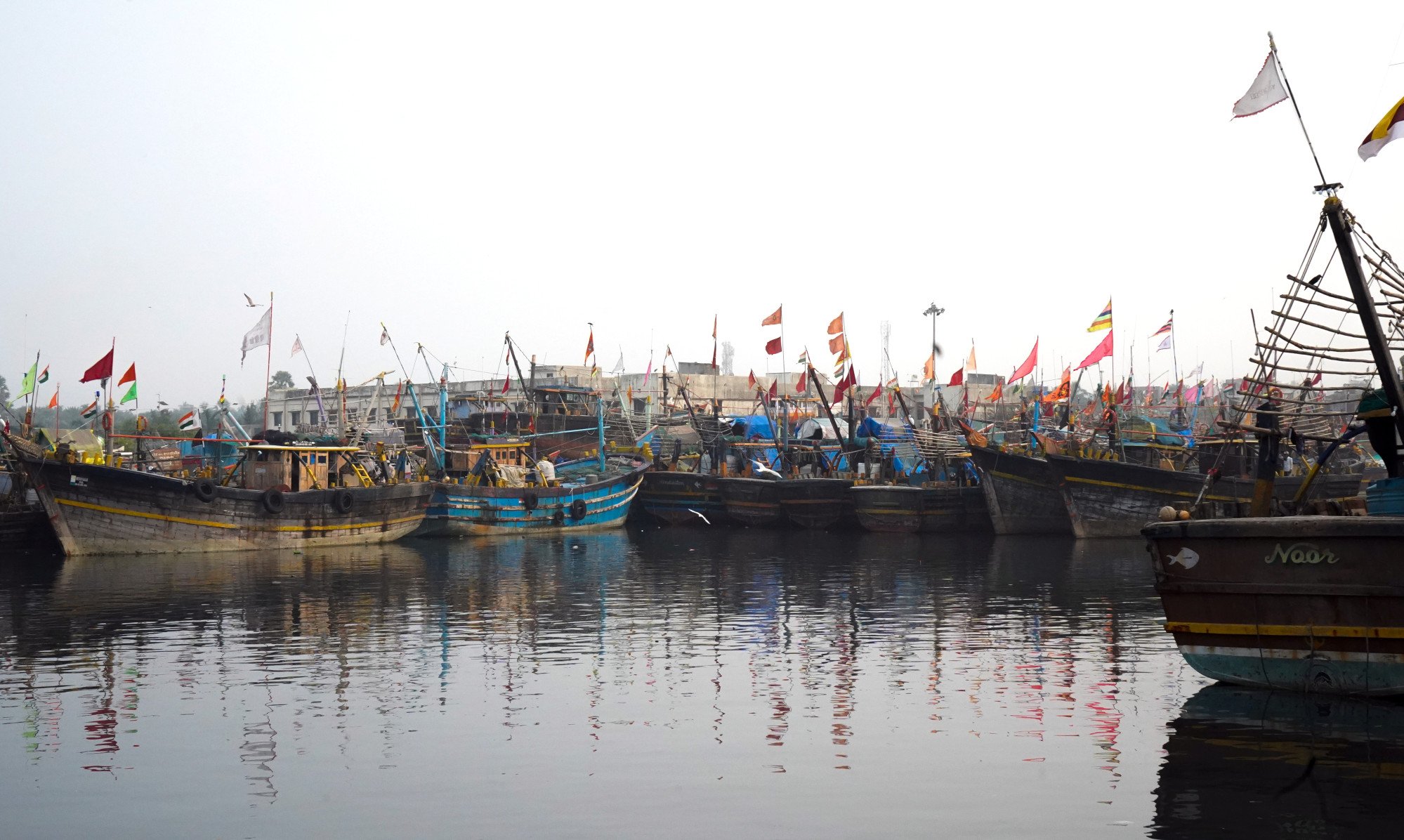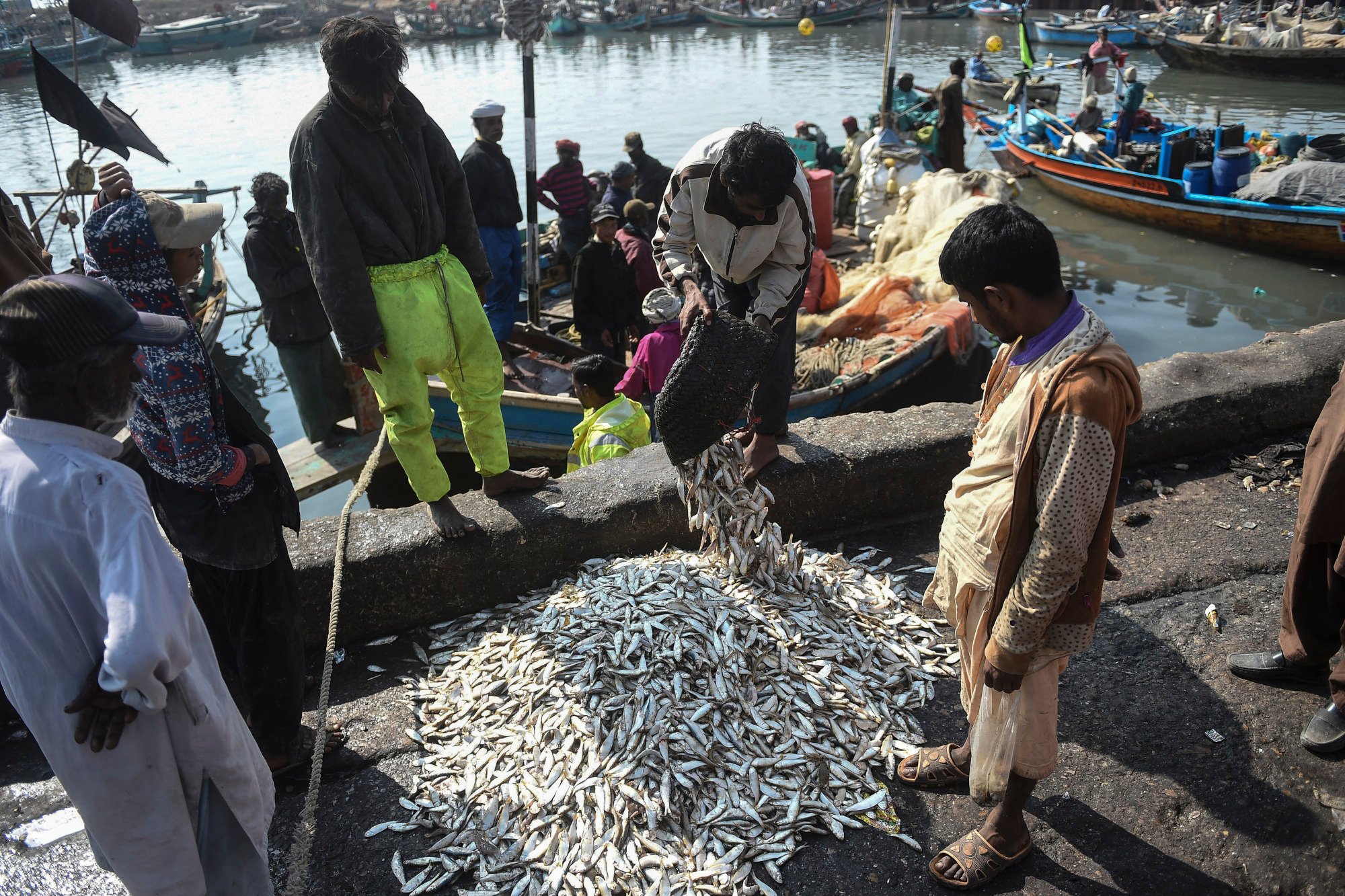[ad_1]
This story was supported by the Pulitzer Center.
For seven years, Indian fisherman Ravibhai Babubhai Bariya, 30, made his dwelling taking his trawler out into the Arabian Sea and promoting his catch in his village in western Gujarat state.
His work introduced in a median earnings of 18,000 Indian rupees (US$220) per 30 days, which his mother and father relied upon fully.
But one fateful day in 2018, he and his crew of seven had been apprehended by Pakistan’s Maritime Security Agency for allegedly partaking in unlawful fishing inside the nation’s waters, after which jailed – an incident so stunning, his ailing father took a flip for the more severe and later died of a coronary heart assault.
“Ravi was our sole breadwinner,” stated Bhanuben, Bariya’s 65-year-old mom. “After his arrest, managing day-to-day expenses and paying for his father’s treatment became very challenging. Each visit to the hospital would cost us 2,000 Indian rupees (US$24), making it financially difficult for us.”

Every 12 months, fishermen from India and Pakistan enterprise into the opposite nation’s maritime boundary strains and find yourself getting arrested. As they serve out their jail sentences, their family members are left grappling with financial hardship.
Official information from each nations indicated that as of January 1, there have been 184 Indian fishermen in Pakistani custody, whereas round 81 Pakistani fishermen had been held in Indian jails. Like Bariya, lots of the Indian fishermen incarcerated in Pakistan come from Gujarat, which boasts India’s longest shoreline at 1,600km.
Various causes immediate fishermen from each nations to enter their neighbour’s waters. The depletion of fish shares inside the Indian portion of the International Maritime Boundary is a significant driver, alongside quite a lot of seasonal issues.
Sri Lankan fishermen farm sea cucumbers as Chinese firm offers lifeline
Sri Lankan fishermen farm sea cucumbers as Chinese firm offers lifeline
However, when requested why there are extra Indian fishermen in Pakistan than Pakistani fishermen in India, Veljibhai Masani, president of Akhil Bhartiya Fishermen Association, defined that modifications in ocean situations attributable to international warming had affected fish migration patterns and their portions round Gujarat.
“The seawater from Kutch to Sindh is favourable for [Indian] fishermen because it is deep, and there are fewer big ships in that region. Due to this, the area has a lot of fish. Fishermen go there for better catches, sometimes getting too close to the International Maritime Boundary Line (IMBL),” he stated.
Masani, who has devoted a few years to facilitating the discharge of Indian fishermen detained in Pakistan, stated a humanitarian method was wanted to take care of fishermen from each side, who had been largely poor and illiterate.

On prime of the stress and productive years misplaced from being incarcerated, the fishermen had been additionally shedding their investments on their boats. According to India’s fisheries division in Veraval district of Gujarat, Pakistan presently holds greater than 1,169 boats, every of which is estimated to price no less than 6 million Indian rupees (US$72,000).
“At the time of the arrest, they not only capture the fishermen but also seize their boat and the catch. However, upon release, only the fishermen are set free,” stated Nayan Makwana, assistant superintendent of fisheries and deputy director of the fisheries workplace in Veraval.
“We have repeatedly pressured the Pakistani government to release the boats as well, because losing their boats means losing a source of livelihood,” he added.
According to Makwana, Pakistan returned 57 boats as a goodwill gesture 5 years in the past, however there had been no such launch since then.
What is the purpose in arresting a poor fisherman? You shouldn’t play with the lives of poor fishermen and their households
Jatin Desai, a journalist and activist from Mumbai who campaigns for the discharge of fishermen on each side, stated Pakistan’s unusual launch of Indian boats in 2019 could possibly be attributed to political local weather on the time.
After successful his second time period, Indian Prime Minister Narendra Modi had invited regional leaders to New Delhi, together with Pakistan’s then prime minister Nawaz Sharif. Modi repaid the gesture with a historic journey to Pakistan the next 12 months, making him the primary Indian chief to go to the rival nation in many years, spawning hope of a thaw in ties. Several optimistic gestures got here out of that go to, together with the discharge of fishermen from each nations, in addition to of Indian fishing boats.
Desai stated it was necessary for each governments to not view this concern by way of a political lens, and urged for the adoption of a “no-arrest policy”.
“What is the point in arresting a poor fisherman? If we see a [Pakistani] boat, why don’t we send them back? Why don’t we seize their catch or release it in the sea?” Desai questioned. “More than 1,000 Indian boats are confiscated in Pakistan. Imagine the financial loss. You shouldn’t play with the lives of poor fishermen and their families.”
Desai blamed the communications embargo between the nations for additional complicating the matter. The transfer was enacted round when the pandemic ended, as diplomatic ties between the rival neighbours once more soured, leading to an absence of political will to free the fishermen.
Both nations prohibit any type of engagement between the arrested individuals and their households. Therefore, they solely obtain information about their family members when there may be an replace on their launch – or within the worst-case state of affairs – their demise.
‘Always harassed’: the Filipino fishermen ensnared by South China Sea geopolitics
‘Always harassed’: the Filipino fishermen ensnared by South China Sea geopolitics
The latter tragically befell Maniben Bhupatbhai Vala, whose husband died simply weeks earlier than his scheduled launch with a gaggle of fishermen set to be repatriated again to India in time for the Diwali competition.
“We had no communication with him during his time in Pakistan. His last letter came to us with prisoners who were released from there,” Vala stated. “In that letter, he assured us he was well and would be home soon. But only his body arrived. They said he died of a heart attack. We knew nothing about his medical condition.”
After her husband’s loss of life, Vala stated she sought assist from her family members and neighbours in Gujarat’s Dudana village to maintain herself and her household. But the help and handouts are barely sufficient to make ends meet, not to mention enable her to make repayments for the money owed she incurred when her husband was behind bars.
“While my husband was in prison, we received 300 Indian rupees per day from the government. But a monthly income of 8,500 rupees is not enough to survive these days. So we borrowed a lot of money that I promised to pay back once my husband came home,” Vala stated. “But with his passing, we don’t know what to do. My daughter also quit her studies after the 10th grade due to financial problems. It is very difficult to manage things without him.”

Over in Pakistan, the family members of jailed fishermen additionally suffered, Desai stated. For instance, their kids usually needed to cease attending faculty. If a household had a son and a daughter, they may select to solely educate the boy. This traps women right into a cycle of poverty they’ve few choices to interrupt out of.
According to Pakistan’s Foreigners Act, the sentence for unlawful fishing shouldn’t be greater than six months, Desai stated. However, authorities can take a very long time to confirm the identities of fishermen earlier than they’re launched – and even after a fisherman’s nationality is established and he has accomplished his sentence, it doesn’t at all times imply he will likely be let go.
“Many of the Indian fishermen currently in prison in Karachi have already been verified and served their sentences. Out of the total 186, around 154 individuals have no valid reason to be kept in jail,” Desai stated. “Additionally, there are 100 people who were supposed to be released, but for unknown reasons, they were not. All the necessary procedures for their release were completed. So, why are they still in jail?”
Anil, 46, returned house on Diwali final 12 months after spending seven years jailed in Pakistan. He stated he had spent many a sleepless evening in a dingy cell desirous about his household, craving to be house.
“Our families suffer the most in our absence. There is no one to raise a voice for our cause,” he stated. “A rich man’s son will have a dozen people rallying for him. Whom do we have?”
[adinserter block=”4″]
[ad_2]
Source link